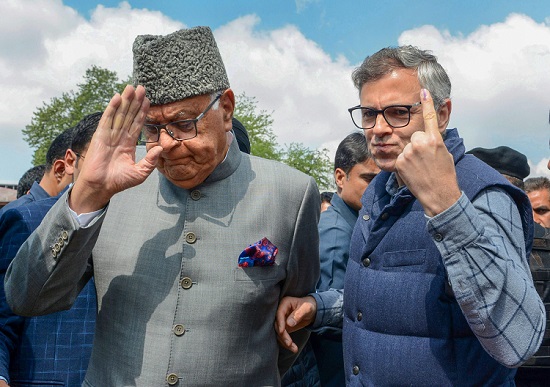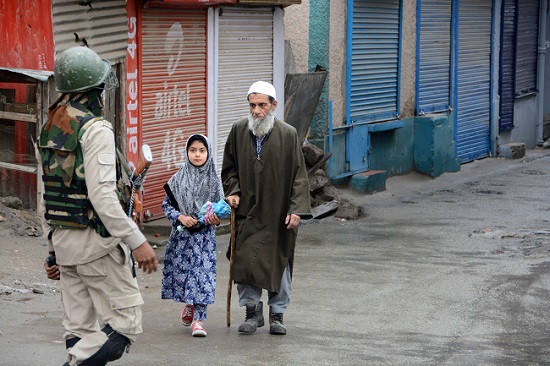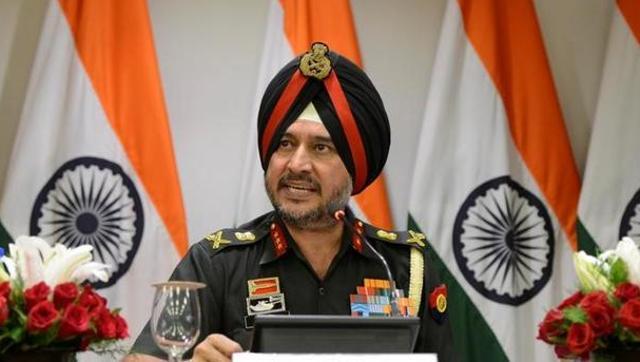“Indian
Army is a very potent, responsive and accountable element of national power. It
remains committed to be able to take on any challenge as far as external threats
are concerned and similarly take on any internal disturbances when called upon
to do so. So, as far as the Army is concerned we always carry on in a
professional manner and a very strong code of conduct and we have been doing so
ever since army was employed in counter terrorist operations in 1990,” said Lt.
Gen. Ranbir Singh, the General Officer Commanding-in-Chief of the Northern
Command which is responsible for the northern military theatre of the nation,
comprising the state of Jammu and Kashmir.
The
General was speaking to media on the sidelines of a function held at the
Command Headquarters in Udhampur to present financial aid to 71 selected
students from below poverty line category and belonging to the remote areas of
Jammu and Kashmir.
The
financial aid provided under Sadbhavana, a welfare initiative of the Army, included
scholarship to the tune of Rs 1.45 crores. The 71 students (45 for Army Public
School, Beas and 26 for Drona Boys Hostel, Udhampur) were handed over the
scholarship certificates and cheques which cover the complete expenditure of
their schools to include education fees, boarding, lodging and transportation.
Speaking
on the occasion, the Army Commander said that Army would do everything possible
within the ambit of Sadbhavana to assist the civil population of J&K,
especially those who are affected by terrorism. “So far as Operation Sadbhavana
is concerned, it was conceived to ameliorate the suffering of the people living
in remote, inaccessible areas and affected by the military operations. Its
success is in front of you. So many children who have been trained under the
initiative have grown to become very useful members of society,” he said.
The
event also provided an opportunity to take stock of the situation in Jammu and
Kashmir. The General gave an assurance that the Indian Army was fully prepared
to thwart each and every inimical action by Pakistan and the country will not
be able to succeed in its designs. “They dare not try and come anywhere near
the line of control to carry out any kind of action. Our deterrence and
articulation of our military strategy is very clear. Should there be any
misadventure by Pakistan, they will be given a befitting reply,” said the
General while asserting that the Indian Army has the capability, the resolve and
the operational plan to take on any challenge from Pakistan whenever it may
arise.
The
Indian Army is maintaining a strong counter infiltration grid on the border to
ensure that no infiltrators can get in. In the hinterland, the counter
terrorism grid is potent enough to facilitate incisive operations on the basis
of credible intelligence and neutralise terrorists.
During
this year the security forces have been able to neutralise 86 terrorist and
operations continue. 20 terrorists have been apprehended during this period. A welcome
development is that the initiative by the security forces to involve parents,
teachers and other prominent members of civil society in an attempt to wean
away young boys misled into the fold of terrorism has witnessed a fair degree
of success with a large number having rejoined the mainstream.
The
General Officer attributed the conduct of free, fair and peaceful general
elections in the state to the unrelenting efforts of the security forces and
the civil administration. Those who came out to vote strengthened democracy and
chose their representatives for the highest seat of legislative power in the
country.
While
referring to the line of actual control with China, the Army Commander said
that peace and tranquillity has been ensured there with the development of
mechanisms of confidence building to ensure that there are no friction points.
If at all there are friction points the mechanisms ensure that the situation
does not escalate.
Gen.
Singh also confirmed that the Indian Army considers the surgical strike of
September 2016 to be the first operation of this nature carried out against
Pakistan. To substantiate his point, he referred to a reply to an RTI by the
Director General Military Operations (DGMO) of the Army which has confirmed
that the first surgical strike happened in September 2016. “I don’t want
to go into what political parties say, they will be given an answer by the
government. What I have told you is a statement of fact,” he said.
The interaction by the Army Commander and his views on
various aspects concerning Jammu and Kashmir will assist in the build up of the
policy of the new government once it take oath of office. The NDA government,
under the able leadership of Prime Minister Narendra Modi, will wish to reassess
its Kashmir policy and bring about certain changes that are in tune with the
current realities. These realities have been articulated in great measure by
the Army Commander.
The
prime minister of Pakistan, Imran Khan, has for long been laying the foundation for resumption of
talks, toward which end he has made many overtures. In consideration of the
strong position that India has with respect to the security situation, the
talks should be carried out from a position of strength and righteousness. The
successful conduct of the general elections builds the confidence to hold the
state assembly elections also on an early date. The political leadership of the valley would be well advised
to take a leaf out of the “Winning Hearts and Minds’ (WHAM) initiative of the
army. It provides succour through the
welfare initiative, Operation Sadbhavana, in a manner that gains confidence of
the common man.
It is quite apparent from the
articulation of Lt. Gen. Ranbir Singh that the security forces have, yet again,
created an environment of peace wherein political activity is possible; it is
now up to the political leadership to leverage the same and apply a balm on the
open wounds of the people who have been traumatised by violence and disruption
for decades on end.










